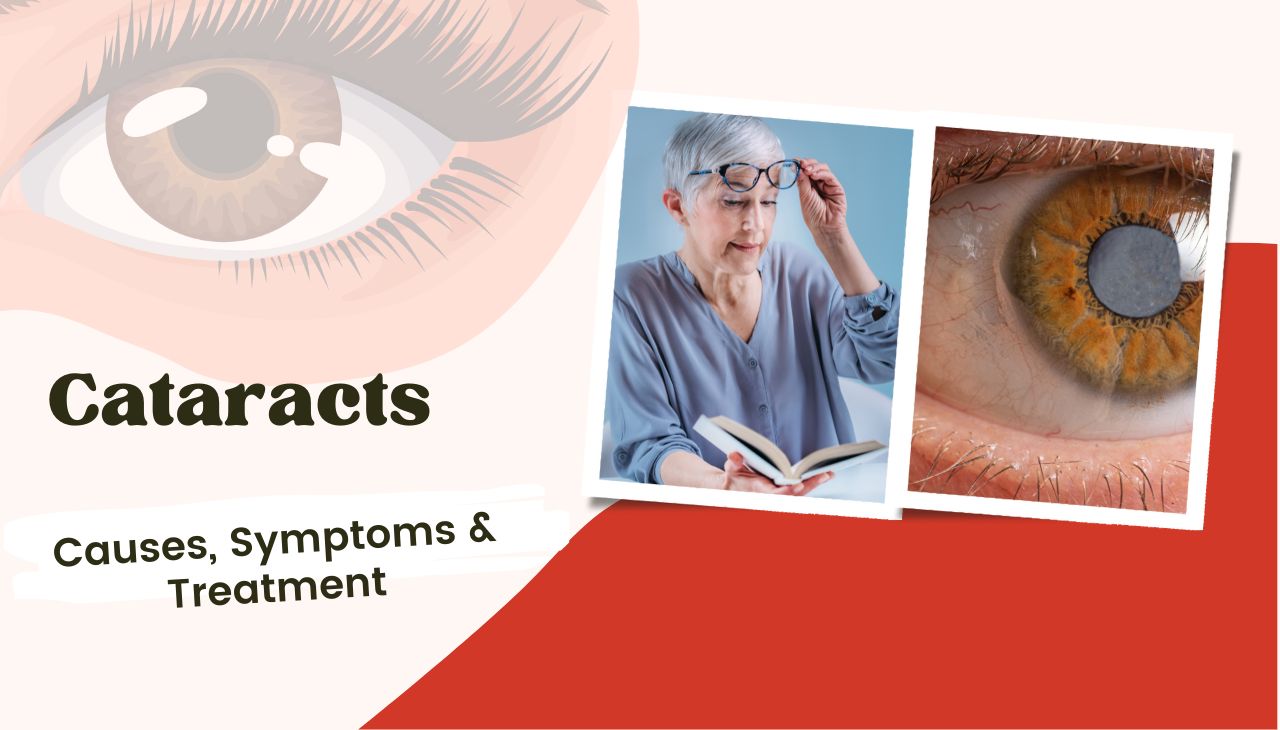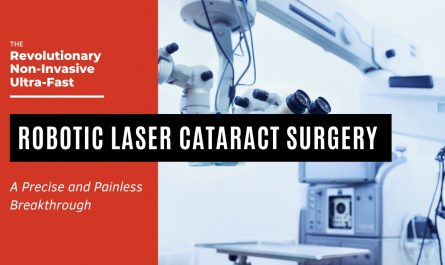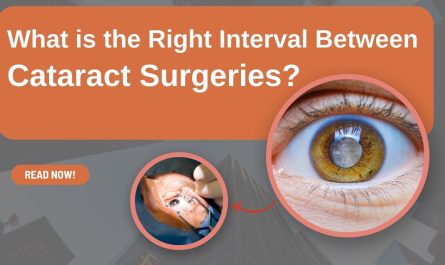Introduction
Cataracts are one of the leading causes of vision impairment worldwide, affecting millions of people, especially as they age. A cataract occurs when the natural lens of the eye becomes cloudy, leading to blurred vision and, if left untreated, potential blindness. While cataracts are commonly associated with aging, they can also develop due to various medical conditions, lifestyle factors, or genetic predispositions. In this blog, we will explore the causes, symptoms, and treatment options for cataracts, ensuring you have a clear understanding of this common eye condition.
What Are Cataracts?
Cataracts develop when proteins in the eye’s natural lens break down and form clumps, creating a cloudy area that obstructs light from passing through clearly. This clouding can make it difficult to see details, read, drive, or recognize faces. Cataracts typically develop gradually and can affect one or both eyes.
Types of Cataracts:
- Nuclear Cataracts – Develop in the center of the lens and are often associated with aging.
- Cortical Cataracts – Form on the outer edges of the lens and gradually extend toward the center.
- Posterior Subcapsular Cataracts – Occur at the back of the lens and progress more quickly than other types.
- Congenital Cataracts – Present at birth due to genetic factors or maternal infections during pregnancy.
Causes and Symptoms of Cataracts
Causes of Cataracts:
Cataracts are primarily caused by aging, but several other factors can contribute to their development, including:
- Aging – The most common cause, as proteins in the lens break down over time.
- Genetics – A family history of cataracts increases the risk.
- Diabetes – High blood sugar levels can damage the eye’s lens.
- Prolonged UV Exposure – Excessive exposure to sunlight can speed up cataract formation.
- Smoking and Alcohol Consumption – Both habits can accelerate lens damage.
- Eye Injuries or Surgeries – Trauma or previous surgeries can lead to cataracts.
- Certain Medications – Long-term use of steroids can increase the risk.
Symptoms of Cataracts:

Cataracts typically develop gradually, and early symptoms may be subtle. Common signs include:
- Blurred or cloudy vision
- Sensitivity to light and glare
- Difficulty seeing at night
- Fading or yellowing of colors
- Frequent changes in eyeglass prescription
- Double vision in one eye
- Halos around lights
If you notice any of these symptoms, it is essential to consult an eye specialist for an early diagnosis.
Treatment Options for Cataracts
Cataracts cannot be reversed through medication or lifestyle changes; however, their progression can be slowed down, and vision can be restored through surgical intervention.
Non-Surgical Management (Early Stages):
- Stronger Prescription Glasses – May temporarily help improve vision.
- Anti-Glare Lenses – Useful for night driving and reducing glare.
- Brighter Lighting – Helps improve visibility for reading and other tasks.
- Lifestyle Adjustments – Managing diabetes, quitting smoking, and protecting eyes from UV exposure can slow progression.
Surgical Treatment:
Cataract surgery is the only definitive treatment when vision impairment affects daily life.
- Phacoemulsification (Phaco) – The most common procedure where an ultrasound device breaks up and removes the cloudy lens, replacing it with an artificial intraocular lens (IOL).
- Small Incision Cataract Surgery (SICS) – A slightly larger incision is made to remove the lens manually before inserting an IOL.
- Laser-Assisted Cataract Surgery – Uses laser technology for precise incisions and lens removal, offering improved accuracy and recovery.
Cataract surgery is a safe and highly effective procedure with a short recovery time, restoring clear vision for most patients.
Expert Eye Care at Laxmi Eye Hospital
Laxmi Eye Hospital is one of the largest and most trusted chains of eye hospitals in Mumbai, providing exceptional eye care for over 30 years. With a team of highly experienced ophthalmologists and cutting-edge technology, Laxmi Eye Hospital offers best-in-class diagnostic and treatment options in Panvel, Kharghar, Kamothe, and Dombivli.
Specialties at Laxmi Eye Hospital:
Laxmi Eye Hospital offers a range of specialized eye care services, including Specs Removal procedures like Bladeless LASIK, ICL, IPCL, and Contoura Vision LASIK. They provide Cataract Surgery using Phacoemulsification and SICS techniques, along with treatment for Glaucoma and Diabetic Eye Care. The Cornea Clinic specializes in Keratoconus Management and Eye Donation. Additionally, the hospital offers Retina Treatment and Pediatric Ophthalmology services.
Clinic Locations & Appointments:
- Dombivli: Laxmi Eye Institute, SS Business Park, Gharda Circle, Azde Gaon, Dombivli East, Mumbai, Maharashtra 421201
- Kharghar: Office 108-110, 1st Floor, Anant CHS Plot 31, Sector 04, Kharghar, Navi Mumbai, Maharashtra 410210
- Panvel: Mulla Hamid Rd, Old Panvel, Navi Mumbai, Maharashtra 410206
- Kamothe: Shop No 26/27, Near ICICI Bank, Kamothe, Navi Mumbai, Maharashtra 410209
Book an appointment today to receive expert eye care tailored to your needs.
FAQs
1. Can cataracts be prevented?
While cataracts cannot be completely prevented, wearing UV-protective sunglasses, maintaining a healthy diet, and avoiding smoking can reduce the risk.
2. Is cataract surgery painful?
No, cataract surgery is performed under local anesthesia and is virtually painless. Most patients experience only mild discomfort post-surgery.
3. How long does recovery take after cataract surgery?
Most patients recover within a few days, with complete healing taking around four weeks.
4. Can cataracts return after surgery?
No, but some patients may develop posterior capsule opacification (PCO), which can be treated with a quick laser procedure.
5. At what age do cataracts typically develop?
Cataracts usually start developing after age 40, but significant vision impairment often occurs after 60.
6. Do both eyes get operated on at the same time?
No, cataract surgery is typically performed on one eye at a time, with a gap of a few weeks between procedures.
Conclusion
Cataracts are a common but treatable eye condition. Understanding their causes, symptoms, and treatment options empowers individuals to seek timely care and maintain healthy vision. If you or a loved one is experiencing vision problems due to cataracts, consulting an expert ophthalmologist at Laxmi Eye Hospital is the best step toward restoring clear sight. Book a consultation today and take the first step towards better eye health!




